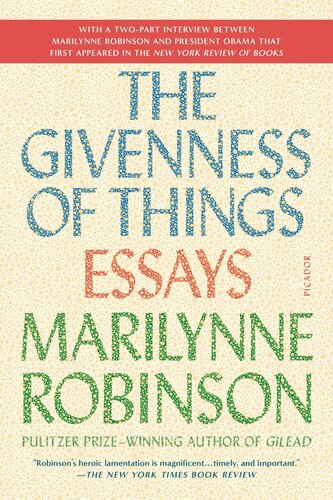
The Givenness of Things
Essays
کتاب های مرتبط
- اطلاعات
- نقد و بررسی
- دیدگاه کاربران
نقد و بررسی

Starred review from August 10, 2015
This probing, provocative collection by Pulitzer winner Robinson (Gilead) argues for the recovery of humanism as
a response to the problems of our historical moment. Robinson's is a "humanism articulated in the terms of Christian metaphysics," based on a deep reading of the Bible and her self-declared Calvinism. She is as impressively erudite and incisive in dealing with Shakespeare's "theological seriousness" and the literariness of the Reformation as in examining the current American allegiance to science over wonder, competitiveness over generosity, technology over art. The essays demonstrate an engaging humility, a quiet voice pure of accusation or bombast, and insight touched with humor. Robinson's surgically precise prose and disciplined thought convey regret for human fallibility just as strongly as reverence for human potential. Her solution is a moral reparationâa reinvigoration of "the conceptual vocabulary of religion" and "a more considered understanding of the soul" that acknowledges "the ontological centrality of humankind in the created order." "To value one another is our greatest safety," Robinson writes, "and to indulge in fear and contempt is our gravest error." Eloquent, persuasive, and rigorously clear, this collection reveals one of America's finest minds working at peak form, capturing essential ideas with
all "the authority beautiful language and beautiful thought can give them." Agent: Ellen Levine, Trident Media Group.

August 1, 2015
A sober, passionate defense of Christian faith. In these 17 essays, Pulitzer Prize-winning novelist Robinson (Iowa Writers' Workshop; Lila, 2014, etc.) returns to themes she considered most recently in her memoir, When I Was a Child I Read Books (2012): ethics, morality, reverence, and her own convictions as a Christian. "My Christology is high," she writes, "in that I take Christ to be with God, and to be God. And I take it to be true that without him nothing was made that was made." Much scientific thinking, she believes, draws conclusions from only a "radically partial model of reality" that excludes the marvelous and the improbable. She criticizes, for example, "the reductionist tendencies among neuroscientists" to propose a material model for the human mind; instead, she finds the soul "a valuable concept, a statement of the dignity of a human life and of the unutterable gravity of human action and experience." Robinson is an astute critic of self-righteousness among some who identify as Christians: "a harshness, a bitterness, a crudeness, and a high-handedness" has entered political life, she maintains, causing some in the "religious monoculture" to be self-serving, self-congratulatory, and insular. This kind of American Christian identity, she sees, is "rooted in an instinctive tribalism" that incites resentment, rage, and bigotry. Contemporary America, she writes, "is full of fear," but fear "is not a Christian habit of mind." This fear "operates as an appetite or an addiction. You can never be safe enough." Fear also leads to rash actions, such as increased gun sales, which are often justified by misreadings of the Second Amendment. As she notes, "gun sales stimulate gun sales-a splendid business model." Besides offering close readings of biblical texts, Robinson also considers the works of Calvin, Shakespeare, Dietrich Bonhoeffer, and William James. Deeply thoughtful essays on troubling and divisive cultural-and spiritual-issues.
COPYRIGHT(2015) Kirkus Reviews, ALL RIGHTS RESERVED.

September 15, 2015
In this collection of essays, Pulitzer Prize winner Robinson (Iowa Writer's Workshop; Gilead) reflects on many of the themes that appear in her novels. The author comes from a Calvinist background and offers a positive view of the 16th-century Reformation theologian John Calvin, most remembered for the theology of predestination and his influence on the Congregationalists, who populated much of the American colonies. Here, Robinson tackles big issues: grace and forgiveness, the nature of belief, what it means to call oneself a Christian. Many of her examples stem from literature; in fact, the essay on grace is a reflection on numerous passages from William Shakespeare, whom she sees as particularly concerned with grace. Other entries concentrate on theological topics, often citing Calvin, whom Robinson seeks to rehabilitate. Readers who enjoy Frederica Matthewes-Green's writings on the relevance of Eastern Orthodoxy will particularly relish Robinson's reflections on Calvinist doctrine. VERDICT A fine collection by a skillful and thoughtful writer that will appeal to anyone interested in the connection between religion and literature, or who savors reading a solid discussion of deep topics.--Augustine J. Curley, Newark Abbey, NJ
Copyright 2015 Library Journal, LLC Used with permission.

Starred review from October 1, 2015
While questions of faith underpin Robinson's award-winning Iowa novels (Gilead, 2004; Home, 2008; Lila, 2014), she addresses religious and moral questions head-on in her new essay collection, following When I Was a Child I Read Books (2012). Robinson's intellectual inquiries, works of rhapsodic clarity, are erudite, passionate, and bracing. A self-described theist, writer, and scholar, Robinson delves into neuroscience and metaphysics, celebrating the study of the complexity of the human brain, while cautioning against mechanistic reductiveness and elucidating our sense of self and the valuable concept of the soul. She scrutinizes the Reformation as a catalyst for learning and literature, exploring the works of Shakespeare and John Calvin. Stating, I attach religious value to generous, need I say liberal, social policy, Robinson protests the yoking of Christian and right, condemns pathologically narrow thinking, including our worship of financial gain over justice, and advocates for the humanities with ringing eloquence and wisdom. She decries today's unashamed racism, gun violence, incarceration for profit, unbridled power, and cynicism and vulgarism. Robinson also asks us to recognize the dire impact we are having on the planet. These bravely and brilliantly argued, gorgeously composed, slyly witty, profoundly caring essays lead us into the richest dimensions of consciousness and conscience, theology and mystery, responsibility and reverence.(Reprinted with permission of Booklist, copyright 2015, American Library Association.)

























دیدگاه کاربران